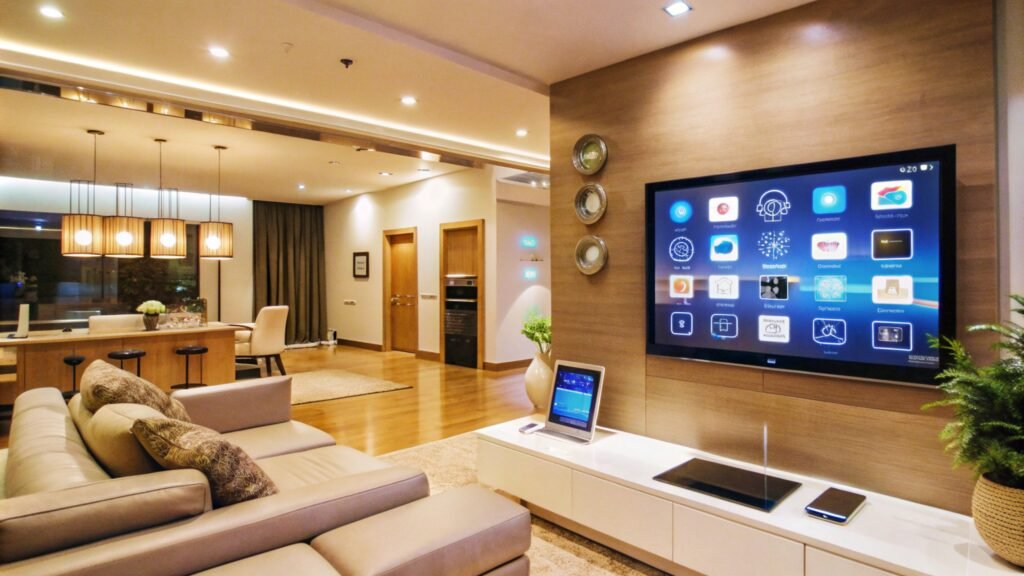Introduction
In today’s tech-driven world, smart home installation is no longer just a luxury — it’s becoming a standard for modern living. From controlling lights with your voice to securing your property with AI-powered cameras, smart homes are transforming how we interact with our living spaces. Whether you’re building a new home or upgrading your existing one, understanding the costs, process, and top brands involved in smart home setup can help you make the best decision for your budget and lifestyle.
What Is Smart Home Installation?
A smart home installation involves integrating intelligent devices and systems into your home that can be controlled remotely through smartphones, voice assistants, or automation hubs. These systems may include lighting, thermostats, security cameras, entertainment systems, and appliances — all connected via Wi-Fi or a dedicated smart home hub.
Some of the most common components in a smart home setup include:
- Smart Lighting: Automate brightness, color, and scheduling.
- Smart Thermostats: Adjust room temperatures automatically based on preferences.
- Smart Security Systems: Include video doorbells, sensors, and surveillance cameras.
- Smart Appliances: AI-enabled refrigerators, washing machines, and ovens.
- Voice Assistants: Amazon Alexa, Google Assistant, or Apple HomeKit for voice control.

Why Choose a Smart Home Setup?
- Convenience: Manage your entire home from your phone or voice command.
- Energy Efficiency: Automations can reduce power consumption significantly.
- Enhanced Security: Real-time alerts, motion sensors, and remote surveillance improve safety.
- Increased Property Value: Homes equipped with smart systems appeal to tech-savvy buyers.
- Comfort and Personalization: Create lighting moods, automate routines, and enjoy personalized experiences.
Smart Home Installation Process
Setting up a smart home requires planning and understanding your home’s layout and needs. Here’s a breakdown of how the process usually works:
Step 1: Assessment and Planning
The first step involves evaluating your home to identify which systems to automate. A professional installer will inspect Wi-Fi coverage, electrical setup, and compatibility between devices.
Step 2: Choosing Devices and Brands
Next, you’ll select the devices that fit your lifestyle and budget. It’s important to pick compatible devices that can communicate effectively with your chosen hub or ecosystem.
Step 3: Installation and Integration
Experts will install smart switches, hubs, sensors, and cameras, ensuring all devices connect seamlessly. Proper configuration is key to making sure systems run smoothly.
Step 4: Customization and Setup
Once installed, you can customize scenes, automation schedules, and routines — for example, turning lights off when you leave home or activating your AC before you arrive.
Step 5: Testing and Training
The final step includes system testing and user training so that you understand how to operate and maintain your new smart home system efficiently.
Smart Home Installation Costs
The cost of smart home installation depends on the number of devices, type of automation, and professional fees. Here’s a general cost overview:
| Type of Smart System | Estimated Cost (INR) | Description |
| Smart Lighting System | ₹10,000 – ₹60,000 | Includes bulbs, switches, and dimmers |
| Smart Security Setup | ₹15,000 – ₹80,000 | Includes cameras, locks, and alarms |
| Smart Thermostats | ₹8,000 – ₹25,000 | Energy-efficient climate control |
| Smart Entertainment | ₹20,000 – ₹100,000 | Includes smart TVs, speakers, and hubs |
| Complete Home Automation | ₹1,00,000 – ₹5,00,000+ | Full system integration |
Tip: Prices vary depending on brand, home size, and professional installation charges. While DIY systems are cheaper, professional setups offer seamless integration and better security.
Top Smart Home Brands in 2025
If you’re planning to invest in automation, here are the leading brands trusted worldwide:
- Amcrest Smart Home – Known for its high-quality security cameras and AI-based monitoring systems.
- Philips Hue – The pioneer in smart lighting solutions.
- Google Nest – Offers an extensive range of thermostats, doorbells, and cameras.
- Amazon Alexa Devices – Excellent for hands-free control and compatibility.
- Wavetechglobal.com Smart Home Gurus – A growing brand known for advanced AI integration and professional installation services across India.
- Samsung SmartThings – Provides a powerful ecosystem that connects all your devices seamlessly.
Smart Homes Using AI in India: Opening Up New Possibilities
In India, smart homes using AI are rapidly gaining popularity. AI enables real-time decision-making — like adjusting lighting based on time of day or automatically locking doors when you leave. As affordability improves and internet infrastructure strengthens, more homeowners are turning to smart home systems that learn and adapt to their routines.
Leading tech companies like Wavetechglobal.com Smart Home Gurus are at the forefront of this revolution, helping Indian families experience comfort, efficiency, and safety through intelligent automation.
DIY vs. Professional Smart Home Installation
- DIY Installation:
Suitable for tech-savvy users who want to start small (like installing smart bulbs or speakers). It’s cheaper but may lack advanced integrations. - Professional Installation:
Ideal for complete automation setups. Professionals ensure compatibility, stability, and security — saving time and reducing errors.
For most homeowners, professional smart home installation is worth the investment for peace of mind and long-term reliability.
Conclusion
A smart home installation is more than just a tech upgrade — it’s an investment in convenience, security, and sustainability. With AI-driven systems and innovative brands like Amcrest Smart Home and Wavetechglobal.com Smart Home Gurus, the future of home automation in India looks brighter than ever. Whether you choose a DIY setup or a professional installation, the possibilities are endless in creating a home that truly understands you.
